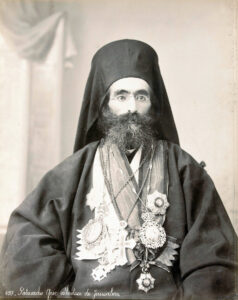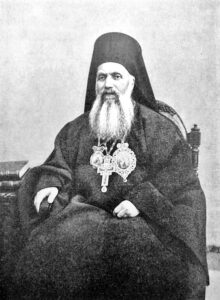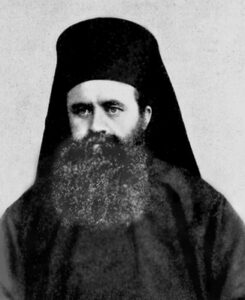For most of the 18th and 19th century, the Patriarchate of Antioch was controlled by ethnic Greeks rather than the local Arabic-speaking people. The Patriarch was always a Greek, a member of the Brotherhood of the Holy Sepulchre, which controlled not only Antioch but also Alexandria and Jerusalem. (Today, Jerusalem remains under the control of the Brotherhood.) As the 19th century wore on, the native Antiochians chafed under the rule of what they viewed as Greek interlopers.
In 1885, the Greek Patriarch Hierotheos of Antioch died at the age of 85. He had served as Patriarch for 34 years, and the historian Derek Hopwood wrote that Hierotheos “continued to reign until he was overtaken by senility, which in Arab opinion saved the Church from ‘utter destruction’.” The local Orthodox population of the Patriarchate clamored for a Patriarch of their own people to succeed Hierotheos, but, according to Hopwood, the ruling Greek minority “argued (and bolstered their argument with considerable sums of money), that there was no Arab fit to assume the office of patriarch and that the Arabs as a whole were under Russian influence.” The Ottoman government duly approved Gerasimos, a Greek member of the Brotherhood of the Holy Sepulchre, as the next Patriarch of Antioch.
In 1890, the Brotherhood elected Gerasimos to be the next Patriarch of Jerusalem. Although technically lower in the diptychs, Jerusalem was a far wealthier see than Antioch, and Gerasimos agreed to the switch. With the throne of Antioch vacant, the local Orthodox hoped that one of their own might finally become Patriarch. But the Syrians were not themselves unified: a faction of Orthodox elites in Damascus was actually opposed to a native Patriarch, fearing that the election of a Syrian would reduce their own influence. The Brotherhood of the Holy Sepulchre proposed a Greek candidate, Spyridon, who is said to have offered a large bribe to the elites of Damascus to support his election. Thus Spyridon was elected, and from the beginning, there was discontent. Patriarch Spyridon proved to be a capricious leader, moving clergy around and dispensing discipline arbitrarily, closing schools, and hiding the Patriarchate’s finances from the rest of the Holy Synod. He was so hated that, according to Hopwood, “the Arabs refused to have anything to do with him, holding their services in graveyards and burying their dead unblessed.”
***
During this period, the Russian Palestine Society had begun to take charge of the Orthodox schools in the Patriarchate of Antioch. This was done with the permission of Patriarch Spyridon of Antioch, but in 1897 the Patriarch told the Palestine Society that he had no further use for their services. This unpopular position, combined with the obscure matter of his having granted an uncanonical divorce to a dragoman of the Ottoman governor, angered the local Orthodox faithful. A crowd gathered in the patriarchal cathedral in Damascus, demanding Spyridon’s deposition. The governor tried to defuse the situation, but Patriarch Spyridon poured gasoline on the fire by threatening to arrest two priests who did not commemorate him liturgically. Finally, with the support of the Ottoman governor, the Holy Synod met in the summer of 1898. The majority of the bishops on the Holy Synod were Syrians, and they deposed Spyridon, who fled to Constantinople.
The local Orthodox of Antioch were finally on the brink of regaining control of the Patriarchal throne. To succeed, they needed the backing of the Ottoman state. Initially, the Porte required them to choose a Greek to be locum tenens, so the (Syrian majority) bishops of the Holy Synod selected Germanos of Adana. In theory, then, a Greek was still in control of the throne, but in practice the overwhelming Syrian majority on the Holy Synod, led by Metropolitan Gerasimos of Zahle, was decisive. The Russian consul in Damascus, Belyaev, supported the local Orthodox and acted as an intermediary with the Ottoman authorities. With Belyaev’s help, the Holy Synod received permission from the Porte to follow the patriarchal election procedures used by Constantinople. This was a major coup for two reasons: firstly, it meant that the local Orthodox laity would have a role in the election, and secondly, it meant that the two Greek bishops on the Antiochian Holy Synod were ineligible, since they had not been in their sees for at least seven years, as required by the Constantinople rules.
In March 1899, the local Antiochians won another victory, as the Sultan approved the removal of the Greek locum tenens of Antioch and his replacement by the Syrian Metropolitan Meletius Doumani of Latakia. At this point the Ottoman government was internally divided over the question of Antioch: the Sultan, influenced by the Russian ambassador, was inclined to favor the Syrian cause, while his ministers, especially the Grand Vizier, were decidedly pro-Greek. The three Greek-controlled patriarchates (Constantinople, Alexandria, and Jerusalem) lobbied the Ottoman ministers as well as the British and French diplomats, arguing that the election of a Syrian Patriarch would be disastrous: the Syrians lacked qualified candidates, and a Syrian would inevitably be beholden to Russia. The Sultan wavered, as his ministers pushed hard for a Greek Patriarch.
By the end of April, tired of Porte’s vacillation, the Syrian Metropolitans and key laymen of Antioch met to discuss the possibility of holding an election without prior approval from the Sultan. This would be a major step, pitting the Patriarchate against both the Greeks and the Turks. It would only be possible with Tsarist support, which was enthusiastically offered by the Russian consul to Damascus, who was present at the meeting. The majority of both the bishops and laymen at the meeting voted to hold an election immediately, without Ottoman authorization. The mixed assembly nominated three bishops – all Syrians, of course – and then gathered in the Patriarchal cathedral in Damascus to hold an election behind locked doors. Soon the doors were opened, and the new Patriarch was announced: Meletius Doumani, the first native-born Syrian to hold the Patriarchal throne in over 170 years.
Patriarch Meletius was elected, but the matter was by no means closed. Legally, a new Patriarch needed an official authorization – a berat from the Sultan. Ecumenical Patriarch Constantine V protested Meletius’s election, and the Sultan’s ministers ordered the Ottoman governor of Damascus to depose Meletius and reinstate the Greek locum tenens. But the governor, who favored the Syrian cause, procrastinated. Meanwhile, Russian diplomats inserted themselves even more directly into the process, with the Russian ambassador holding multiple meetings with the Sultan to lobby for acceptance of Meletius’s election. The Sultan did not issue a berat to Meletius, but he also did not demand his removal and even went so far as to send a friendly reply to a telegram from Meletius.
The ambiguity persisted into the fall. In November, the Porte instructed the Antiochian Holy Synod to hold a new election, which they did – again electing Meletius Doumani as Patriarch. This time, the Sultan and his ministers immediately confirmed the election. On November 13, Meletius was enthroned. The first person to receive communion at the Divine Liturgy was Belyaev, the Russian consul in Damascus.
While the Porte may have accepted Patriarch Meletius’s election, the Greek Patriarchates did not. When Meletius sent the traditional letter announcing his election to the other autocephalous churches, the only ones to respond were Russia, Serbia, and Romania. In 1900, Antioch had to obtain Holy Chrism from Russia, since its usual supplier – the Ecumenical Patriarchate – did not recognize Meletius as Patriarch. The same year, Antioch adopted a written constitution, ensuring that future Antiochian patriarchs could be elected without further difficulty.
***
Then in February 1906, Patriarch Meletius died. The Antiochian Holy Synod quickly appointed a senior metropolitan, Athanasius of Emesa, as locum tenens and set the date for a nominating election to be held on May 3. Meanwhile, Patriarchs Photios of Alexandria and Damianos of Jerusalem viewed the Antiochian vacancy as an opportunity for the Greeks to regain control of Antioch, and they lobbied Ecumenical Patriarch Joachim III to make this happen, but in March, the Holy Synod of Constantinople voted against intervention.
On May 3, the Antiochian nominating vote was held. The results were forwarded on to the Sublime Porte in Constantinople, which had the right to eliminate any unacceptable names and was supposed to respond within 24 hours. Instead, the Antiochians were left in limbo for an agonizing three weeks, as Photios of Alexandria and Damianos of Jerusalem continued to push for a Greek Patriarch of Antioch. Finally, Joachim III responded to his brother patriarchs with a pastoral letter rejecting their overtures. Joachim concluded, “An intervention, at this hour of crisis, would only further sour the mutual relations, and postpone for an indefinite period the peace so longed for.”
Finally, at the end of May, the Porte notified Antioch that its candidates were all approved, with the Sultan confirming the Antiochians’ right to elect their own patriarch. This confirmation, more so even than Meletius Doumani’s election as patriarch in 1899, represented the end of the Antiochians’ battle for control over their own Church. On June 18, the electoral assembly held a final nominating vote at the Patriarchal Cathedral in Damascus, narrowing the list to three candidates, and then unanimously elected Metropolitan Gregory Haddad of Tripoli as the new patriarch. The doors of the cathedral were thrown open and the result was announced to the throngs of faithful waiting outside. The crowd rushed into the church to receive a blessing from the new Patriarch-Elect.
It took another two months before the Ottoman government confirmed Gregory’s election by issuing a berat, but when it did come, it recognized Gregory as having privileges within his Church equal to those of the Ecumenical Patriarch in his. Gregory’s enthronement took place a week later, and the Orthodox in Damascus celebrated by decorating their houses with palms and flowers. Gregory sent the customary letters announcing his election to the other autocephalous churches, but the only ones to reply were Russia, Serbia, and Romania. As Echos d’Orient, a contemporary Roman Catholic journal, puts it, “The Synod of Athens and the three Greek patriarchates of Constantinople, Alexandria, and Jerusalem did not acknowledge receipt of the irenic letters and persist in their sulking.”
Then, at long last, in August 1909, Ecumenical Patriarch Joachim III sent a letter to Patriarch Gregory of Antioch, recognizing him as the rightful Patriarch of Antioch and reestablishing communion. The Patriarch of Jerusalem sent a similar letter in September, the Greek hierarchy finally accepting that Antioch was now firmly in the hands of its indigenous people.
Main Sources
Lora Gerd, “Russian policy in the Patriarchate of Antioch from the 1840s to 1914: ‘soft power’ in Syria and Lebanon,” Contemporary Levant (2021).
E. Goudal, “L’élection du patriarche grec-melchite orthodoxe d’Antioche,” Echos d’Orient 10:66 (1907), 209-305.
Derek Hopwood, The Russian Presence in Syria and Palestine 1843-1914: Church and Politics in the Near East (Oxford: Clarendon Press, 1969).



Dear Mr Namee,
I read your new article on the Patriarchate of Antioch with great interest and profit (like All the earlier ones on the history of the Patriarchate of Constantinople etc.).
I would like very much to publish a German translation in our monthly information service “Orthodoxie aktuell” and ask you to give kindly your permission to do so.
The publication could appear in the issue for August or September (the June-July issue has just appeared as a double issue).
I hope that the proposal meets with your approval, which I would be very pleased about.
With the greatest respect
Ipodiakon Nikolaj Thon
Editor
Email: orthodoxe-kirche@web.de
Thank you for asking. Yes, feel free to translate at publish it in your journal.
After what we see today and before the f wrong doings in E.P. it’s good that we separated.
it seemsto me that it is about time the greek control over jerusalem ceases, and that middleeastern bishops lead the way.
There will not be many “middle eastern bishops (or even population)” the way the war is going. The Israelis respect the Greeks far more than the Arabs for obvious reasons. They may view an Arab Jerusalem Patriarchate as a provocation and decisive actions will be taken against the Patriarchate. So you may want to rethink your position.
Can you write a text about the schism in the Church of Antioch – 1928 – 1935?
That’s on my list for 2024.